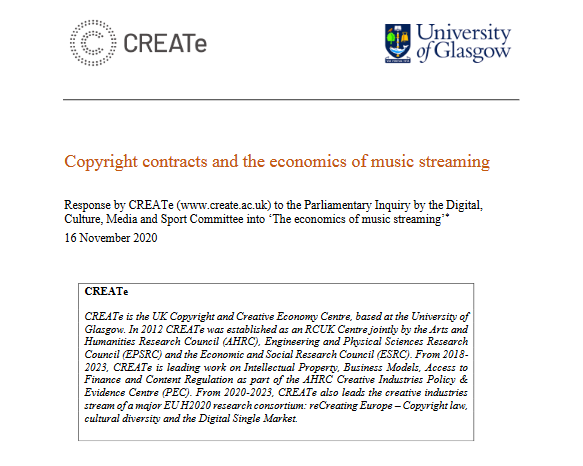CREATe has submitted evidence to the Parliamentary Inquiry by the Digital, Culture, Media and Sport Committee into the ‘Economics of Music Streaming’.
In recent years music streaming has become the pre-eminent means for the dissemination and consumption of recorded music. This has fundamentally altered the core revenue generating activity of the recording industry. It has changed from an industry principally engaged in the manufacture and sale of music products to an industry engaged in licensing access to music services. This shift has profound ramifications for primary creators, investors and consumers.
The CREATe contribution to the Inquiry draws on empirical research conducted by CREATe researchers examining the music copyright industries and relevant research on IP in the wider creative industries as part of the AHRC Creative Industries Policy & Evidence Centre (PEC) at the University of Glasgow.
The evidence presented focuses on one question posed in the call: How can policy favour more equitable business models?
The CREATe submission highlights the difficulties contingent in attempting to construct a digital music environment modelled on conventions established in the analogue era. As such, it seems unlikely that redefining streaming of sound recordings as ‘communication to the public’ akin to radio broadcast will be practicable or result in remunerative equity for creators and investors.
Moreover, the financial rewards that creators receive from streaming services are, to a significant extent, governed by the contracts they enter into with record companies and music publishers. The submission argues that existing remedies such as the ‘use it or lose it’ and ‘best-seller clause’ provisions should be augmented by limitations to contractual assignability of copyright.
As music streaming is the site of fierce contention between interested parties, the Inquiry is sure to attract a considerable volume of evidence and, in turn, further intensify the debate. The emergence of ad-funded and subscription-funded music streaming services that followed the public launch of Spotify in the UK in 2009, was heralded in some quarters as a potential antidote to the perceived threat posed by unauthorised digital file-sharing in the wake of Napster. However, from the outset, concerns were raised with regards to creator remuneration and contested definitions of the act of streaming in copyright law i.e. the communication to the public/making available right. More than a decade later, these questions continue to permeate debates around music streaming in 2020. Indeed, the issue of creator remuneration from digital streaming emerged several times at a recent event involving CREATe researchers, ‘Who’s Zoomin’ Who?: Music, Precarity and Copyright’.
This DCMS call for evidence is indicative of the significant digital challenges facing regulators in the wider cultural sector. These debates have considerable resonance with CREATe research focussing on authors’ earnings, reversionary rights and platform regulation. Collectively and individually, CREATe members have recently contributed written submissions and oral evidence to the ongoing Inquiry in the adjacent field of public service broadcasting.
What seems clear is that more than a decade after the emergence of authorised music streaming services, the conundrum of constructing an equitable and sustainable model that reciprocally benefits all stakeholders remains unresolved. Submissions of written evidence to the Inquiry close on Friday 11 December.



